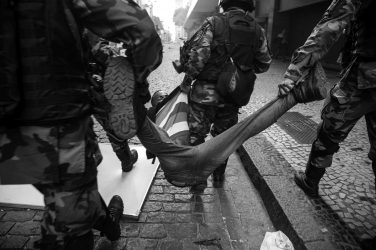After a week of total chaos that left more than 120 people dead, the military police’s illegal strike in the state of Espírito Santo, in southeastern Brazil seems to be getting to an end.
Authorities in that state say police will return to work on Saturday thanks to an agreement that was reached between the parts. The families of the striking police, however, say that they were not informed of the resolution and that they will continue their effort to prevent the police cars to leave for patrolling.
The walk-out is expected to end at 7 am on Saturday morning, at which time police officers “will return to their duties,” said Julio César Pompeu, the Secretary of Human Rights of Espírito Santo, which had been negotiating an end to the strike.
Pompeu said those who supported the strike “will not suffer disciplinary sanctions” as long as they present themselves to work until 7 am.
The state’s entire police force walked off the job a week ago in a row over pay, when the officers’ female relatives side-stepped a law barring police from demonstrating and barricaded the obliging officers into their police stations.
While officers walked off the job, the army was called in to maintain law and order
On Friday, authorities threatened to charge more than 700 striking police officers with rebellion. It is unclear whether those threats led to the end of the strike. If convicted, the officers could be sentenced to between eight and 20 years in military prison.
Since the strike began, assaults, looting and murders in the state have skyrocketed. More than 120 people have been reported killed, approximately six times the state’s average daily homicide rate last year.
In his first public remarks since the start of the police crisis, Brazilian President Michel Temer on Friday called the strike “unacceptable” and said, “The right to protest cannot take the Brazilian people hostage.”
The central government, which had already sent some 1,200 soldiers to the state in an attempt to quell chaotic scenes, was prepared to deploy an additional 3,000 troops by the weekend if the strike persisted.
Espírito Santo is already suffering from a budget crisis, part of an ongoing nation-wide recession that has limited public services and forced many of Brazil’s states to meet austerity targets in order to qualify for debt relief from the federal government.
Businesses, shops, public transport and schools have remained closed throughout the week as many citizens avoided the streets.
The police strike has spread to the Rio de Janeiro state, just south of Espírito Santo, where residents fear a broad-scale police absence could lead to a spike in violent confrontations.
According to a police spokesperson, 95 percent of Rio officers were on duty as scheduled and only five police stations had been barricaded, with demonstrations taking place outside of 27 of the state’s 100 total stations.
But the action forced mayors of various cities in Rio to head off any further crisis by promising to cover state salary shortfalls with city finances.
Many are anxious about whether a total strike in Rio could overlap with the state’s famous Carnaval festivities arriving at the end of the month, but so far officials do not expect the demonstrations to impact the celebrations.
Lawlessness
Local media has been broadcasting video of muggings, carjackings, looting and other violence as the cities, including state capital Vitória, remained bereft of law enforcement.
After four days of strike, Espírito Santo had already seen about 200 robberies and about 90 million reais (US$ 29 million) in damages to local businesses, the local police union said as the federal government remained mum on crime figures.
“We are taking steps to increase the level of the National Force, which is police, and of the armed forces so that we can have security,” Governor Colnago told the press. He said the condition on the streets had deteriorated so badly that many were afraid to leave their homes.
The Military Police, as the forces patrolling Brazil’s city streets are known, were demanding better working conditions and higher pay as the country’s budget crisis has begun to affect all sectors of society.
Although they are barred by law from going on strike, relatives and sympathizers have blocked police stations and the officers are not trying to get out.
A court declared the strike illegal and the state police chief was removed from office, but these measures had little effect.
DW/Bzz














